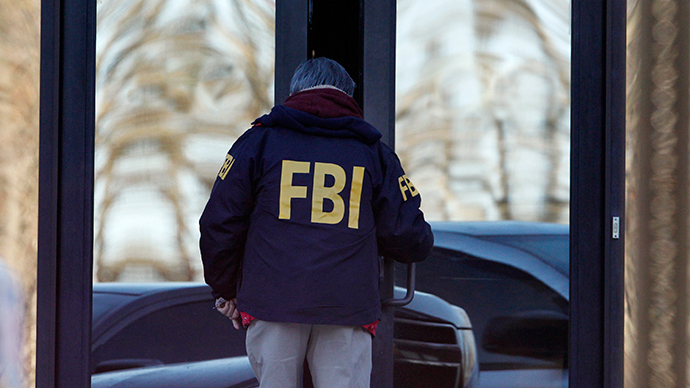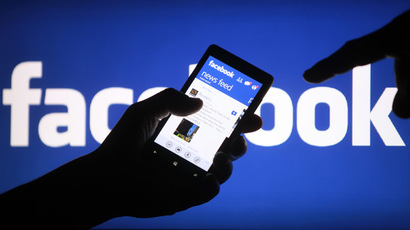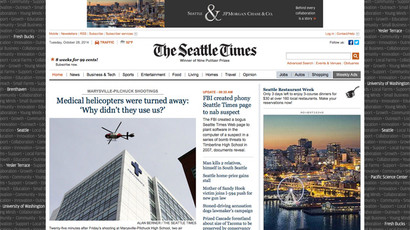FBI says agent impersonated AP journalist in 2007 sting op

The Associated Press issued a harsh denunciation of the Federal Bureau of Investigation (FBI) after the internal intelligence agency admitted one of its agents had posed as an AP reporter during a 2007 criminal investigation.
An FBI agent impersonated “an employee of the Associated Press” as part of an operation to bring charges against a young suspect believed to be delivering bomb threats at a high school in Olympia, Washington, FBI Director James Comey wrote in a letter to the New York Times on Thursday.
READ MORE: FBI pretended to be Seattle newspaper in order to hack suspect’s computer
The comments come as the latest revelations in a story that
rattled the news industry last week when it was discovered that
the FBI in 2007 had created a mock-up of the Seattle Times in order to spread
spyware on to a suspect’s computer.
The FBI’s sting operation involved sending a bogus Seattle Times
article to the suspect’s MySpace account. The link, which
directed the suspect to an Associated Press article called
“Bomb threat at high school downplayed by local police
department,” was hosted on an FBI computer, and, when
clicked, secretly revealed the suspect’s location and IP address.
Kathleen Carroll, executive editor of the AP, slammed the FBI’s
covert activities as "unacceptable."
"This latest revelation of how the FBI misappropriated the
trusted name of the Associated Press doubles our concern and
outrage, expressed earlier to Attorney General Eric Holder, about
how the agency's unacceptable tactics undermine AP and the vital
distinction between the government and the press," Carroll
said in a statement.

Meanwhile, the FBI director gave no assurance that such methods
would not be employed again in future criminal investigations.
"That technique was proper and appropriate under Justice
Department and FBI guidelines at the time. Today, the use of such
an unusual technique would probably require higher-level
approvals than in 2007, but it would still be lawful and, in a
rare case, appropriate," Comey wrote.
Comey defended the use of undercover operations to catch criminals, saying such methods have “long been a critical tool in fighting crime."
In a letter Thursday to the FBI Director and Attorney General
Eric Holder, the Reporters Committee for Freedom of the Press
requested full disclosure about this latest media infringement.

"The utilization of news media as a cover for delivery of
electronic surveillance software is unacceptable," the
letter said. "This practice endangers the media's credibility
and creates the appearance that it is not independent of the
government.
“It undermines media organizations' ability to independently
report on law enforcement."
The FBI, however, is not the only government agency taking
advantage of the virtual world of the internet to ensnare
suspects in criminal investigations.
READ MORE: Senate and AP demand disclosure of all cases where FBI posed as media
Last month, the US Drug Enforcement Administration [DEA] was
slapped with a lawsuit after it was
discovered the agency created a bogus Facebook account, complete
with photos and other personal data from Sondra Arquiett, who was
arrested in 2010 on charges of possessing cocaine and intent to
supply the drug.
The Facebook page created in her name by DEA Agent Timothy
Sinnigen was devised to lure her associates into revealing
information.
Arquiett is claiming $250,000 in compensation, saying she went
through "fear and great emotional distress" and that
Sinningen endangered her life by communicating through her fake
identity with the “dangerous individuals he was
investigating,” AP reported.














